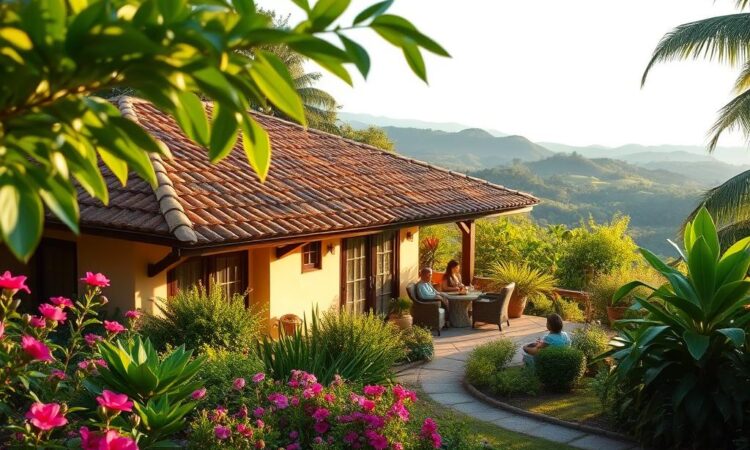
Understanding the Meaning of Home Equity in Costa Rica
At GAP Investments, we specialize in providing tailored financing solutions for private investors looking to capitalize on Costa Rica’s thriving real estate market. Home equity, a crucial concept in this context, represents the difference between the amount owed on a mortgage and the home’s current value. As property owners make mortgage payments and the property appreciates, their equity grows.
For both local and foreign property owners in Costa Rica, understanding home equity is vital. It serves as a significant financial asset that can be leveraged to secure loans or finance new investments. We will explore how home equity works in Costa Rica and how it can benefit property owners.
What is Home Equity in Costa Rica?
Understanding home equity is crucial for anyone investing in Costa Rica’s real estate market.
The Basic Definition of Home Equity
Home equity refers to the current market value of your home minus any outstanding liens, such as a mortgage. In Costa Rica, when you make a down payment of 20% or more on a house, you immediately have equity in your home.
The amount of home equity can fluctuate based on the property’s market value. As the property value appreciates or depreciates, your home equity changes accordingly.
How Home Equity Works in the Costa Rican Market
In Costa Rica, home equity accumulates over time through mortgage payments and property appreciation. This is particularly significant in tourist destinations where property values tend to increase.
The Costa Rican real estate market has its unique characteristics, including different valuation methods and market trends that affect equity calculations. Foreign ownership laws also impact home equity considerations for international investors.
For instance, making strategic down payments and understanding the local market trends can help in building substantial home equity in Costa Rica.
Understanding the Meaning of Home Equity in Costa Rica
Home equity in Costa Rica presents a unique set of opportunities and challenges for homeowners and investors alike. As we delve into the specifics, it becomes clear that the concept of home equity here is shaped by local banking practices, legal frameworks, and market dynamics.
Differences Between U.S. and Costa Rican Home Equity
The way home equity functions in Costa Rica differs significantly from the U.S. market. For instance, banking practices, interest rates, and lending criteria vary between the two countries. In Costa Rica, securing a mortgage as a foreigner can be challenging, but alternative financing options are available, such as working with international lenders or using a self-directed IRA. At GAP Investments, we’ve helped numerous clients navigate these differences and secure loans ranging from $50,000 to over $3,000,000 USD, with competitive interest rates between 12% to 18% annually. You can explore more about our successful cases on our website: https://gapinvestments.com/en/good-job/.

Legal Considerations for Foreign Property Owners
Foreign property owners in Costa Rica must navigate a distinct legal framework governing property ownership. This includes understanding restrictions, requirements, and protections that impact home equity considerations. For example, Costa Rican property laws affect how foreign owners can leverage their home equity, and there are specific documentation and legal processes required to access this equity. Our expertise at GAP Investments helps foreign property owners navigate these legal considerations and make the most of their home equity.
How to Calculate Your Home Equity in Costa Rica
The process of calculating home equity in Costa Rica involves assessing your property’s current market value and subtracting any outstanding mortgage or liens. This calculation is crucial for understanding the financial value of your property.
Step-by-Step Calculation Method
To calculate your home equity, first determine your home’s current market value by researching recent sales of similar properties in your area. For instance, if your home is valued at $350,000 and your mortgage balance is $150,000, your equity would be $200,000. The formula is straightforward: Equity = Value of home – loan balance.
Factors Affecting Home Equity Valuation
Several factors can impact your home equity in Costa Rica, including location, infrastructure development, tourism trends, and economic stability. Additionally, currency fluctuations between the Costa Rican colón and the US dollar can affect equity calculations for foreign investors. Here are key factors to consider:
- Location: Beachfront, mountain, or urban properties have different values.
- Infrastructure development: New roads or amenities can increase property value.
- Tourism trends: Areas popular with tourists may see higher property values.
- Economic stability: A stable economy can positively impact property values.

Building Home Equity in Costa Rica
Building home equity in Costa Rica requires a combination of strategic financial decisions and an understanding of the local real estate market. Homeowners can adopt several strategies to increase their equity.
Making Strategic Down Payments
Making a larger down payment when purchasing a property in Costa Rica can establish immediate equity. This initial investment not only reduces the amount borrowed but also provides a foundation for future equity growth.
Property Improvements That Add Value
Strategic property improvements can significantly enhance the value of your home in Costa Rica. Focus on sustainable features, security enhancements, and outdoor living spaces that are highly valued in the Costa Rican market.
Leveraging Your Home Equity in Costa Rica
Leveraging home equity in Costa Rica can be a strategic financial move for property owners. Homeowners can tap into their property’s value using various financial instruments, including home equity loans and home equity lines of credit (HELOCs).
Home Equity Loans for Foreign Investors
GAP Investments offers specialized home equity loan products for foreign investors in Costa Rica, with loan amounts ranging from $50,000 to $3,000,000. These loans have interest rates starting at 12% and terms ranging from six months to three years, based on the loan-to-value (LTV) ratio and other factors.
Foreign investors can use these loans for various purposes, such as property improvements, additional investments, or business ventures in Costa Rica.
Home Equity Lines of Credit (HELOCs)
A home equity line of credit (HELOC) is a revolving line of credit that allows homeowners to borrow up to a certain amount over a period. HELOCs typically have adjustable interest rates and offer flexible repayment terms.
In Costa Rica, HELOCs can be an attractive option for property owners who need access to funds for various financial needs, providing a convenient and flexible financial solution.
Benefits of Using Home Equity Financing in Costa Rica
For investors in Costa Rica, leveraging home equity financing can unlock significant financial advantages, making it an attractive option for those looking to maximize their investments.
Lower Interest Rates Compared to Other Financing Options
One of the primary benefits of home equity financing in Costa Rica is the lower interest rates it offers compared to other financing options. Home equity products typically have lower interest rates than unsecured loans and credit cards, which can lead to significant long-term savings. At GAP Investments, we offer competitive interest rates ranging from 12% to 18% annually, providing better value than many alternative financing options in the Costa Rican market. By opting for home equity financing, investors can reduce their borrowing costs and allocate more resources towards their investment goals.

Flexibility in Fund Usage for Investors
Home equity financing in Costa Rica also offers investors the flexibility to use funds for various purposes, including property improvements, business investments, or other financial needs. This flexibility is particularly valuable for foreign investors who may need to access capital for different investment opportunities. Moreover, interest on home equity loans used for capital improvements is tax-deductible, which can result in additional savings. By leveraging home equity financing, investors can tap into the value of their properties and achieve their financial objectives more effectively. For more information on home equity lending in Costa Rica, visit GAP Investments.
GAP Investments’ Home Equity Solutions
GAP Investments is a leading provider of home equity financing for foreign investors in Costa Rica’s real estate market. We offer tailored financing solutions for private investors looking to leverage their properties in Costa Rica.
Loan Options from $50,000 to $3,000,000
Our loan options range from $50,000 to over $3,000,000 USD, catering to a variety of investment needs. Whether you’re looking to finance a small renovation or a large-scale investment project, we have the right loan solution for you. Our approval criteria are based on the loan-to-value ratio and other risk factors associated with the property.
Competitive Interest Rates and Flexible Terms
We offer competitive interest rates ranging from 12% to 18% annually, with flexible loan terms that can be customized to meet your investment goals. Our loan terms range from six months to three years, providing you with the flexibility to manage your cash flow effectively. We understand the unique circumstances of foreign investors and provide a streamlined application process to ensure quick access to capital.
For more information on our home equity financing solutions, please contact us at https://gapinvestments.com, or WhatsApp us at +506 4001-6413. You can also reach us from the USA/Canada at 855-562-6427, or email us at [email protected].
Risks and Considerations When Using Home Equity in Costa Rica
The decision to use home equity in Costa Rica should be made with a clear understanding of the potential downsides. While leveraging home equity can be a strategic financial move, it involves navigating various risks associated with the Costa Rican market.
Market Fluctuations and Property Valuation
Property market fluctuations in Costa Rica can significantly impact home equity values. Historical data shows periods of both appreciation and depreciation in different regions. For instance, areas popular with tourists have seen significant appreciation, while less developed areas may experience slower growth or even depreciation.
- Market volatility can affect the value of your home equity.
- Economic uncertainties in Costa Rica can impact property values.
- Regional differences within Costa Rica can lead to varied property valuation trends.
Legal Protections for Foreign Investors
Foreign investors in Costa Rica are protected by robust legal frameworks that safeguard property rights. Lending regulations and recourse options are available in case of disputes, providing a level of security for homeowners using their equity.

Understanding these legal protections is crucial for foreign investors. We recommend thorough research and consultation with legal experts to ensure compliance with all regulations.
Conclusion: Making the Most of Your Costa Rican Home Equity
As we conclude our exploration of home equity in Costa Rica, it’s clear that this financial resource offers significant opportunities for foreign investors. By understanding how to calculate and leverage home equity, investors can access capital for various financial needs, including business ventures and property improvements. At GAP Investments, we provide tailored financing solutions for private investors, prioritizing safety and risk management to offer a secure investment environment.
Our expertise has helped numerous clients succeed in Costa Rica’s vibrant real estate market. We emphasize the importance of working with experienced lenders who understand the local market and the unique needs of foreign investors. By doing so, homeowners can make informed decisions about their home equity, whether it’s for expanding investment portfolios or funding new business initiatives.
To explore your home equity options in Costa Rica and discover how GAP Investments can support your financial goals, we invite you to contact us for personalized consultations. With a forward-looking perspective on the Costa Rican real estate market, we are confident that home equity will continue to be a valuable financial resource for property owners, enabling them to achieve their investment objectives.
Article by Glenn Tellier (Founder of CRIE and Grupo Gap)
